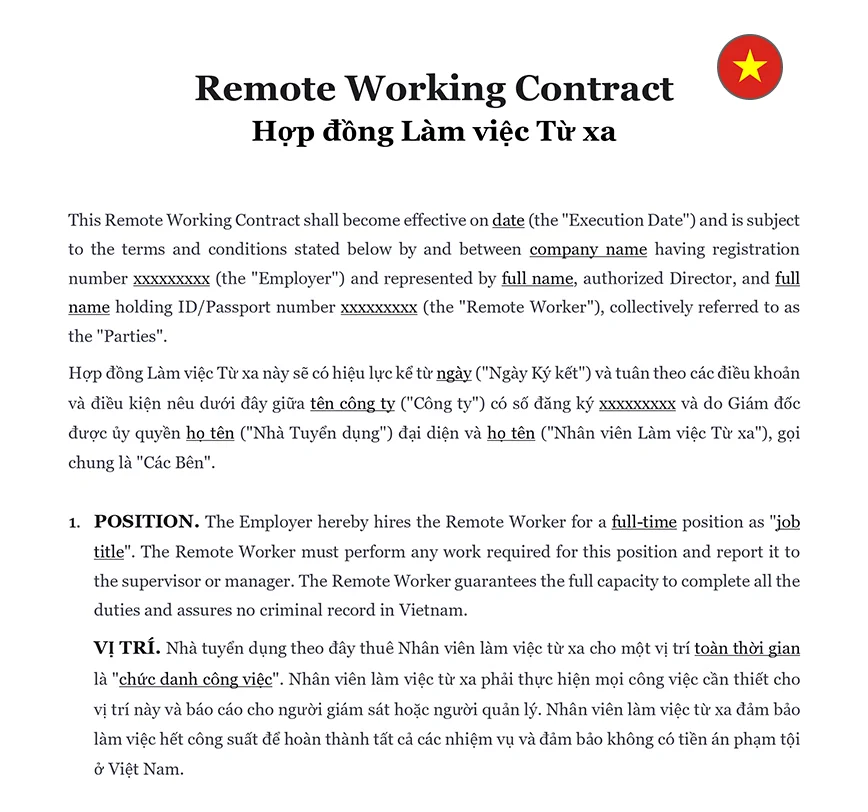Ready to use legal template
Drafted by experienced lawyers
Vietnamese-English translation
Ready to use legal template
Drafted by lawyers
Vietnamese-English translation
Learn more about Remote Working Contract in Vietnam
Our Remote Working Contract offers a meticulously crafted document that delineates the rights and obligations of both employers and employees engaged in remote work arrangements. Developed by seasoned legal professionals well-versed in Vietnamese labor laws, our contract template ensures comprehensive coverage and compliance. With our user-friendly Word format, businesses can seamlessly customize the contract to their specific needs, fostering transparent and secure remote work environments with peace of mind.
Table of contents
What is a Remote Working Contract?
What is included in a Remote Working Contract?
Why use a Remote Working Contract in Vietnam?
How is it different from an Employment Contract?
What are the benefits of having a Remote Working Contract?
Are there legal requirements or regulations that govern Remote Working Contracts?
Are there any limitations or restrictions in Vietnam?
What are the termination conditions in Vietnam?
What is a Remote Working Contract?
A Remote Working Contract is a formal agreement that solidifies the terms and conditions governing the remote work arrangement between an employer and an employee. This document outlines essential details such as the nature of remote work, including work hours, location flexibility, and communication protocols. It also delineates the responsibilities of both parties, addressing issues such as task assignments, performance expectations, and data security measures. Additionally, the contract may cover provisions for equipment and technology requirements, reimbursement policies, and any relevant legal considerations.
By clearly defining the parameters of remote work, a Remote Working Contract serves as a crucial tool for establishing trust and transparency between employers and employees. It helps mitigate potential misunderstandings or disputes by providing a written framework that both parties can reference and adhere to throughout the duration of the remote work arrangement. Moreover, this contract ensures compliance with labor laws and regulations governing remote work, safeguarding the rights and interests of both employers and employees while fostering a conducive environment for remote productivity and collaboration.
What is included in a Remote Working Contract?
A Remote Working Contract typically includes several key components to effectively outline the terms and conditions of the remote work arrangement. These components may vary depending on the specific needs of the employer and the nature of the job, but commonly include:
Identification of Parties: Clearly state the names and contact information of the employer and the employee entering into the contract.
Nature of Remote Work: Define the nature of remote work, including work hours, location flexibility, and any specific tasks or projects to be completed remotely.
Communication Protocols: Specify preferred methods of communication, such as email, phone calls, or video conferences, and establish expectations for response times.
Equipment and Technology: Outline provisions for equipment and technology required for remote work, including who provides them and any reimbursement policies.
Confidentiality and Data Security: Include provisions to protect sensitive information and intellectual property, outlining protocols for data security and confidentiality.
Performance Expectations: Set clear performance expectations, including goals, objectives, and metrics for evaluating remote work performance.
Compensation and Benefits: Detail compensation arrangements, including salary or hourly wages, payment schedules, and any applicable benefits for remote employees.
Termination and Resignation: Specify procedures for termination or resignation, including notice periods and any severance agreements.
Dispute Resolution: Include procedures for resolving disputes or conflicts that may arise during the remote work relationship.
Why use a Remote Working Contract in Vietnam?
Using a Remote Working Contract in Vietnam is essential for several reasons:
| ➤ Legal Compliance: Vietnam has specific labor laws and regulations that govern employment relationships, including remote work arrangements. A Remote Working Contract ensures that both employers and employees adhere to these laws, reducing the risk of legal disputes or non-compliance penalties. |
| ➤ Clarity and Expectations: By clearly defining the terms and conditions of the remote work arrangement, a contract helps to establish expectations regarding work hours, tasks, communication, and performance metrics. This clarity can prevent misunderstandings and promote a productive working relationship. |
| ➤ Protection of Rights: A Remote Working Contract outlines the rights and responsibilities of both parties involved. It helps to protect the rights of remote workers, ensuring fair treatment, compensation, and access to benefits as per legal requirements. |
| ➤ Confidentiality and Data Security: With the rise of remote work, ensuring the security of sensitive information and intellectual property becomes paramount. A Remote Working Contract can include provisions for data security and confidentiality to safeguard the employer's proprietary information and the employee's privacy. |
| ➤ Dispute Resolution: In the event of disagreements or disputes between the employer and the remote employee, a well-drafted contract provides a framework for resolving conflicts through mediation, arbitration, or other agreed-upon methods, minimizing disruption to business operations. |




